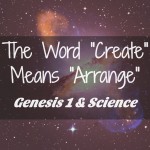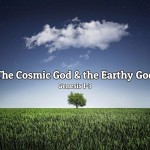Although I tend to disagree with St. Augustine on several issues, he paid us a great debt through his concept of the “Two Books.” He held that we ought to approach the quest for knowledge by holding together the two sacred forms of revelation that God has given to humanity: the Book of Scripture and the Book of Nature. His belief was that these two books are God’s perfect and complementary ways to communicate with his image bearers about truth. They are authored by the same divine pen, so they must work together rather than finding themselves in conflict with each other. In regards to the Bible, its interpretation is multi-layered and not always intended to be read in a “plain sense” literal fashion (literal, as in a surface level reading). One must keep in mind that God accommodated truth to package it in a way that was understandable for the original audience. So, in regards to passages like Genesis one, Augustine did not hold to a literal six-day formation of the universe or even six distinct periods of creation; as is evident in his Literal Interpretation of Genesis (here, literal means the original intent of the authors, not skimming the surface for the “plain sense”).
St. Augustine also believed that some interpretations of difficult texts ought not be held so dogmatically that they fail to leave room for the Book of Nature to have the authority reveal truth about reality. This is not to say that the Bible is ever wrong, but that it is possible that our perceptions of God’s perfect truth can be incorrect at times. As Professor Lawrence Principe states regarding Augustine’s understanding of the Two Books: “Because it is often easier conclusively to prove natural and philosophical propositions than interpretations of specific biblical passages, our interpretations of biblical passages must be informed by the current state of sure scientific and other knowledge.” Now, this does not mean that science trumps Scripture, but rather that we must have enough humility to recognize the validity of other sources of knowledge. Dr. Principe regarding Augustine adds that a “failure to conform interpretations to the certain knowledge gained from other sources (such as the Book of Nature) opens the interpreter, and Christianity as a whole, to ridicule for being unlearned.”[1] His (Augustine’s) ultimate concern was that Christians would not affirm primitive understandings of the Bible over against modern (not modernity, but modern from the interpreter’s vantage point) revelations of science because this would discredit the validity of the faith and God he so cherished.
As we discuss key questions about science and its relationship with the Bible, it is helpful to remember the concept of the Two Books and ask difficult questions of each source of revelation in light of the other. A key question that I have found helpful is: In an apparent contradiction between the Two Books, is there a new path that can be walked that takes the evidence of both with uncompromisable seriousness? In my own upbringing, I had only been exposed to two options. Option one was that the Bible’s obvious conclusions always win. Option two was to simply cast the Bible into the bottomless pit of irrelevance so that science and reason could lead us into the actual, measurable, truth about reality. I think St. Augustine might urge us to chart a new path as we journey through the twenty-first century, so that the truth about both books might be revealed to our culture.
ANY THOUGHTS ON HOW THIS AFFECTS THE CURRENT DISCUSSION ABOUT EVOLUTION AND THE BIBLE?
[1] Coursebook, Science and Religion, 8. http://www.teach12.com/ttcx/coursedesclong2.aspx?cid=4691













